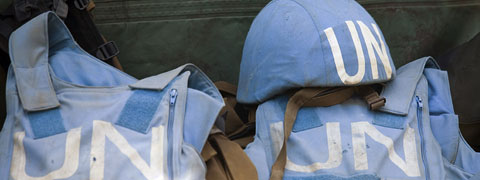New Report from the High-level Independent Panel on UN Peace Operations
Press Clip Source: Peace & Collaborative Development Network (PCDN)
Written By: Craig Zelizer
Date: June 29, 2015
Read Original Article: Here
 Thanks to
Thanks to
Mel Duncan from the Nonviolent PeaceForce for passing this along to PCDN. As Mel wrote "This is the most prominent recognition of Unarmed civilian protection actors in history! The report provides us with a strong platform on which to build."
The report says:
Unarmed strategies must be at the forefront of UN efforts to protect civilians.
Humanitarian organizations play essential roles in protecting civilians. Where appropriate, timely coordination between missions with humanitarian actors is indispensable in pursuing unarmed strategies as these partners often work closely with communities, especially internally displaced persons. Many non-governmental organizations, national and international, also ensure protection by their civilian presence and commitment to non-violent strategies for protection. Missions should make every effort to harness or leverage the non-violent practices and capabilities of local communities and non-governmental organizations to support the creation of a protective environment.
And says:
With respect to protecting civilians, the Panel recommends that:
In view of the positive contributions of unarmed civilian protection actors, missions should work more closely with local communities and national and international non-governmental organizations in building a protective environment.
Reform of peacekeeping
In 2000, the UN started a major exercise to analyze its peacekeeping experience, and introduce a series of reforms to strengthen its capacity to manage and sustain field operations.
This was brought about by the surge in demand for UN peacekeepers, with the ‘blue helmets’ being increasingly asked to deploy to remote and often volatile environments. Peacekeeping also faced a varied set of challenges which included:
deploying its largest, most expensive and increasingly complex operations;designing and executing transition strategies for operations where stability has been achieved;equipping communities as far as possible with capacity to ensure long-term peace and stability.
High-level Independent Panel on UN Peace Operations
Secretary-General Ban Ki-moon established a High-level Independent Panel on UN Peace Operations on 31 October 2014, to make a comprehensive assessment of the state of UN peace operations today, and the emerging needs of the future. Announcing the decision, the Secretary-General said that “the world is changing and UN peace operations must change with it if they are to remain an indispensable and effective tool in promoting international peace and security.” With the 15-year anniversary of the Brahimi report approaching, the Secretary-General felt that it was necessary to again take stock of evolving expectations of UN peacekeeping and how the Organization can work toward a shared view of the way forward.
The 16-member Panel was chaired by Mr. Jose Ramos-Horta of Timor-Leste with Ms, Ameerah Haq of Bangladesh as Vice-Chair. It drew together a wide range of experience and expertise.
The Panel considered a broad range of issues facing peace operations, including the changing nature of conflict, evolving mandates, good offices and peacebuilding challenges, managerial and administrative arrangements, planning, partnerships, human rights and protection of civilians. The review encompasses both UN peacekeeping operations as well as special political missions , which are referred to collectively as “UN peace operations.
The Secretary-General received the Panel’s report on 16 June 2015. A summary of the report by the Panel is now available. The Secretary will study the recommendations of the report carefully and transmit it to the General Assembly and the Security Council.
